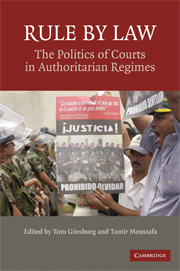Book contents
- Frontmatter
- Contents
- Contributors
- Introduction: The Functions of Courts in Authoritarian Politics
- 1 Of Judges and Generals: Security Courts under Authoritarian Regimes in Argentina, Brazil, and Chile
- 2 Administrative Law and the Judicial Control of Agents in Authoritarian Regimes
- 3 Singapore: The Exception That Proves Rules Matter
- 4 Agents of Anti-Politics: Courts in Pinochet's Chile
- 5 Law and Resistance in Authoritarian States: The Judicialization of Politics in Egypt
- 6 Courts Out of Context: Authoritarian Sources of Judicial Failure in Chile (1973–1990) and Argentina (1976–1983)
- 7 Enforcing the Autocratic Political Order and the Role of Courts: The Case of Mexico
- 8 The Institutional Diffusion of Courts in China: Evidence from Survey Data
- 9 Building Judicial Independence in Semi-Democracies: Uganda and Zimbabwe
- 10 Judicial Power in Authoritarian States: The Russian Experience
- 11 Courts in Semi-Democratic/Authoritarian Regimes: The Judicialization of Turkish (and Iranian) Politics
- 12 Judicial Systems and Economic Development
- 13 Courts in Authoritarian Regimes
- References
- Index
1 - Of Judges and Generals: Security Courts under Authoritarian Regimes in Argentina, Brazil, and Chile
Published online by Cambridge University Press: 05 June 2012
- Frontmatter
- Contents
- Contributors
- Introduction: The Functions of Courts in Authoritarian Politics
- 1 Of Judges and Generals: Security Courts under Authoritarian Regimes in Argentina, Brazil, and Chile
- 2 Administrative Law and the Judicial Control of Agents in Authoritarian Regimes
- 3 Singapore: The Exception That Proves Rules Matter
- 4 Agents of Anti-Politics: Courts in Pinochet's Chile
- 5 Law and Resistance in Authoritarian States: The Judicialization of Politics in Egypt
- 6 Courts Out of Context: Authoritarian Sources of Judicial Failure in Chile (1973–1990) and Argentina (1976–1983)
- 7 Enforcing the Autocratic Political Order and the Role of Courts: The Case of Mexico
- 8 The Institutional Diffusion of Courts in China: Evidence from Survey Data
- 9 Building Judicial Independence in Semi-Democracies: Uganda and Zimbabwe
- 10 Judicial Power in Authoritarian States: The Russian Experience
- 11 Courts in Semi-Democratic/Authoritarian Regimes: The Judicialization of Turkish (and Iranian) Politics
- 12 Judicial Systems and Economic Development
- 13 Courts in Authoritarian Regimes
- References
- Index
Summary
INTRODUCTION
As Ginsburg and Moustafa point out in the Introduction to this volume, few academic studies have taken the law and legal institutions under authoritarian regimes seriously. Most studies of authoritarianism assume that regimes that come to power by force cannot rely on the law to maintain control of society or to legitimate themselves; their unconstitutional origins are seen as making such an effort contradictory and impossible. When analysts do consider the law, they often assume that authoritarian rulers wield it in a direct, unmediated way, relying on their agents to impose their will through consistently compliant courts. Yet even a cursory glance at actual authoritarian regimes, past and present, should lead us to question these assumptions. In fact, authoritarian regimes use the law and courts to bolster their rule all the time, in ways that a simplistic distinction between0 de facto and constitutional (or de jure) regimes obscures. Furthermore, this use of the law can be complicated and ambiguous, furnishing regime opponents and activist judges with venues in which to challenge the prerogatives of the regime and to liberalize authoritarian rule.
It might be thought that a security court would be the last place where such contestation might take place. However, such an assumption would also be incorrect. This chapter examines the use of security courts to prosecute political dissidents in three South American military dictatorships – those of Brazil (1964–1985), Chile (1973–1990), and Argentina (1976–1983).
- Type
- Chapter
- Information
- Rule by LawThe Politics of Courts in Authoritarian Regimes, pp. 23 - 57Publisher: Cambridge University PressPrint publication year: 2008
- 14
- Cited by



